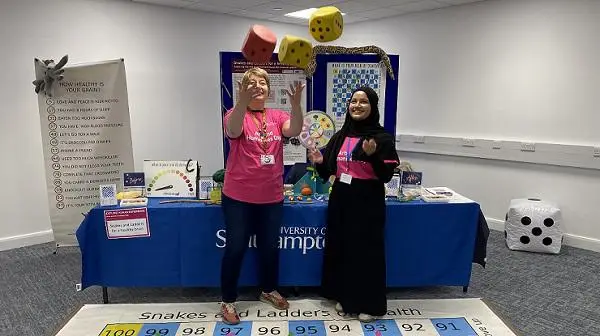Snakes and ladders for a healthy brain
Would you be surprised to learn that not flossing your teeth could increase your risk of developing dementia?
This is one of the lesser-known facts that players of Snakes and Ladders for a Healthy Brain can discover.
The game was developed by Southampton’s Professor Jessica Teeling and Dr Sofia Michopoulou.
Prof Teeling is a Professor of Experimental Neuroimmunology at the University of Southampton. Dr Michopoulou is Head of Nuclear Medicine Physics at University Hospital Southampton.
Snakes and ladders
Around one million people in the UK live with dementia. This figure is expected to rise to 1.6 million by 2050.
As we age, our risk of developing the condition increases. However, research suggests there are some things you can do to reduce the risk.
Nearly half of all dementia cases worldwide could be prevented or delayed by addressing risk factors. These include smoking, high blood pressure, poor diet and inactivity.
Many of the risk factors involve activation of our immune system. This is consistent with growing knowledge of the links between inflammation and dementia.
Prof Teeling’s research focuses on the role of the immune system in the onset and progression of neurodegenerative disease. Her research group investigates the contribution of bacterial infections, the oral-gut microbiome and inflammation to conditions including Alzheimer's and Parkinson's disease.
The snakes and ladders game comes complete with a three-metre-by-three-metre board and giant foam dice. It is designed to teach people about lifestyle choices that prevent (ladder) or increase (snake) the risk of dementia.
As they play, a game host explains why certain factors speed up the development of dementia. They also highlight the role that the immune system plays in this process. Each player takes home a postcard-sized version of the game with further information.

Engaging the public
The team has taken the game to science and humanities festivals, dementia cafés and training events. Recent activities include Southampton's Pride and Mela events, Eastleigh's Unwrapped Festival and the Romsey Dementia Festival.
The activity is also part of the University’s Public Engagement with Research unit roadshow. It was recognised with a Vice-Chancellor's Award for Knowledge Exchange in 2023.
"It's a real attractor at public events," said Prof Teeling. "It's very helpful for starting conversations."
Evaluation after the events showed that 80% of participants changed their perception of the risk factors for dementia. The ones that surprised people most were not flossing and hearing loss. These are both topics of research in Southampton.
Public engagement highlighted barriers in some communities to talking about dementia. There were also things that stopped these people taking part in some of the activities, such as exercise, that can help reduce the risk.
“At the Mela festival, we had some wonderful conversations with younger participants. However, it was harder to talk to some of the older people about dementia; you could see their unease," commented Prof Teeling.
"We particularly want to take the game to underrepresented communities such as the Asian, Black African and Caribbean communities,” she continued. “This is because they are at higher risk of developing dementia."
From awareness to action
Armed with this learning, the team agreed that follow-up was needed to turn awareness into action. They are focussing these activities on commercialisation and exploring options aimed at people in mid-life.
"It's about raising awareness of these risk factors at a stage of your life where you can contribute to better brain health," Prof Teeling explained.
The commercial route "may be through a social enterprise, or by working with a charity to provide support, tools and educational materials based on our research," she said.
Ideas include creating a series of exercise videos. They are also exploring activities such as cooking classes to explain how the gut biome can contribute to the risk of dementia.
Prof Teeling added: "We also want to bring in elements of gamification because we know that it breaks down barriers."
The team is working with Southampton Voluntary Services, charities and public health experts. Together, they are considering ways to use the game and other resources to raise awareness of dementia risk factors. They are also exploring how to engage with healthcare providers and GPs.
Snakes and Ladders for a Healthy Brain received funding from the British Society for Immunology and the Higher Education Innovation Fund.
A version of this article originally appeared in the University of Southampton’s Re:action magazine. Read the full issue here.